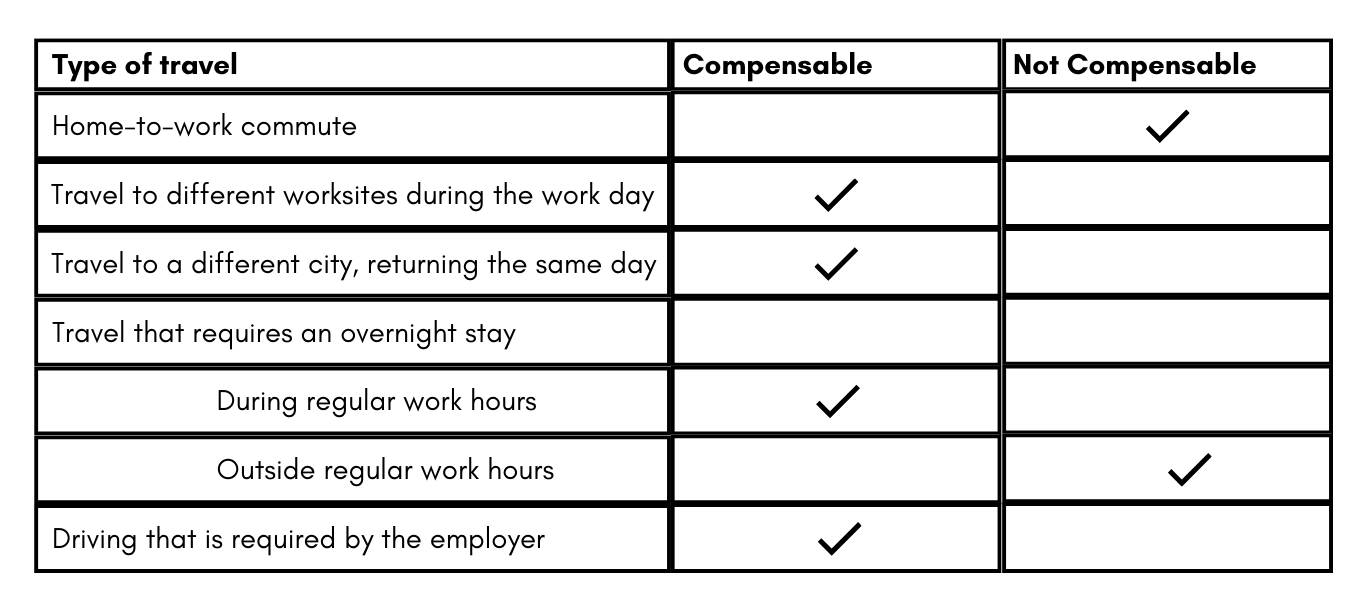Perspectives
Hourly Employee Travel
If a non-exempt employee must travel for work, how much of that travel time is compensable?
Since states do not have laws regarding non-exempt employee travel, this blog covers the federal Fair Labor Standards Act (ACT) and the Department of Labor’s regulations.
When travel requires an overnight stay, any time spent traveling as a passenger that falls within the employee’s “normal work hours” is to be paid, regardless of what day of the week the travel takes place. Therefore, the time spent waiting at the terminal until departure, through the subsequent arrival at the destination, needs to be compensated, when it falls during those normal work hours. However, similar to when an employee is at home, the time spent traveling from home to an airport or train station is considered commute time and is not treated as hours worked, thus not compensable.
For example, if your employee normally works Monday through Friday, 8:00 a.m. to 5:00 p.m., and they are required to travel by plane on a Sunday for business in another state, their travel time on Sunday between 8:00 a.m. and 5:00 p.m., is compensable. Therefore, if the employee arrives at the airport on Sunday at 3:00 p.m. and at their destination at 8:00 p.m., the employer is required to pay only form 3:00 p.m. to 5:00 p.m., the hours that correspond with their normally scheduled work hours. Alternatively, if the employee drives themselves or other (at the direction of the employer) rather than traveling as a passenger, all the time spent driving is payable work time, regardless of the normal work hours.
However-one caveat to those “normal work hours” is that an employee must be paid for any time they are performing work. This includes time spent working during travel as a passenger that would otherwise fall outside normal hours. For instance, if that employee from the above example works on a presentation during their flight until 6:30 p.m., the employer would need to pay them from 3:00 p.m. (arrival at airport) to 6:30 p.m. (turning off computer for the remainder of the flight).
A good practice is to require any traveling hourly employee to record all hours worked and the corresponding times throughout the duration of their trip. The employee needs to be paid for all hours worked even if outside of the normal hours.

Another factor to consider are the costs your hourly employees will incur during business travel-such as food and beverages, hotels, transportation, or incidentals. If there is not a company issued credit card the employee can use, another option is providing a stipend to your employees. Stipends are commonly used to either pre-pay, or pre-approve, the employer designated costs per day during business travel. Pre-paying the employee in this way helps reduce the daily financial burden of a business trip up-front when the employee doesn’t have a company issued credit card. Or, requiring pre-approved costs/rates allows for budgeting control if the employee is booking their own hotels, etc. For example, here is a link to per diem rates in each state that apply to traveling government employees. Many private business follow these rates as well because they are standardized by the cost of each location. The website contains current rates in the continental United State for any reference you might need.
Generally, offering either the stipend or company credit card can remove the reimbursement waiting period for the travel expenses afterwards, which is a common procedure to benefit the employee. Companies are not required to pay travel stipends to employees like they are require to reimburse business travel expenses in general, so the reimbursement process may look different for the individual companies.